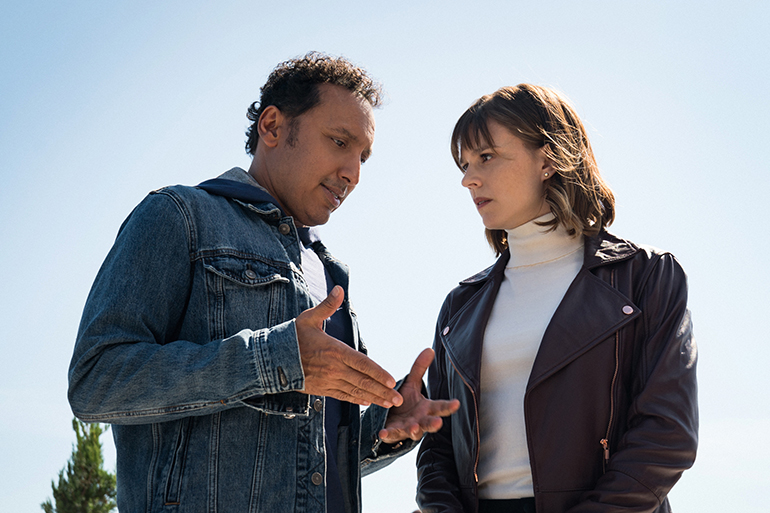Aasif Mandvi Talks Television, Inspiration and Story Creation

The North Fork TV Festival’s Inspiration Award honors someone whose work in television inspires viewers and other creators to move the needle toward a brighter, more open-minded tomorrow. With numerous roles on the small screen—including a nine-year stint on The Daily Show with Jon Stewart and starring roles on CBS’s Evil and Channel 4’s This Way Up—as well as writing credits for HBO’s The Brink and Funny or Die’s Halal in the Family, Aasif Mandvi is a fitting choice for such a prestigious honor. In anticipation of the award ceremony taking place Saturday, October 5 at 4 p.m., Mandvi chatted with us about his inspirations and his dreams for the future of American television.
RELATED: North Fork TV Festival: Showcasing the Best of Tomorrow’s TV
In what ways has your work inspired viewers, and how would you like to see that inspiration evolve in the future?
It’s hard to talk about how I’ve inspired people, because I didn’t set out to inspire anyone. I’m just doing what I do—working and creating stuff that I can create. When you’ve been in the business as long I have, you end up working on a lot of different things. You have a lot of successes, a lot of failures. The first thing is to try and create content that’s inspiring to me. If I’ve possibly inspired other people, you’d have to ask them.
What former acting or writing roles inspired you personally?
Over the years, it’s been doing things that I feel are telling stories about people of color, specifically South Asian stories considering Muslims. Whether you’re trying to create comedic or satirical content, like on The Daily Show, or storytelling work, it’s about trying to tell good stories. Sometimes it’s just about telling a great story that engages people and has characters that they might not have seen before—pushing that envelope a little bit. Trying to tell stories about people who are underrepresented in some way. Obviously, I can’t speak for all the underrepresented voices out there, but I can speak for some of them—being one of them myself. Other times, it’s more satirical stuff like we did on The Daily Show, specifically pointing out things within our system and our country, shedding a light on the hypocrisy of the things that aren’t working, using that satirical lens to broadcast and to eliminate those things. Different work inspires me in different ways. It comes down to trying to work with really talented people and trying to always stay true to raising the bar rather than lowering the bar—attempting to not play to the lowest common denominator.

It’s inspiring that you’re so conscious of diversity and are telling those kinds of stories.
I’m conscious of it, because I’m part of it. Maybe if I was a white dude, I wouldn’t be as conscious of it. It’s my story, so I don’t think of it as an act of inspiration. It’s necessary for me to be conscious of that, because it’s necessary for me to be aware of how to deal with that. I’ve been dealing with the fact that I’m a brown, South Asian, Muslim minority actor in Hollywood for a long time—in TV and in movies. When I first started out in television back in the mid ’90s, there were no roles for brown people. There were no roles. I literally sat around and had no auditions, no pilots. There was nothing, because Hollywood and mainstream television were just not writing content for people who are not white or black, less so black people, mostly white people. All the content was about them. Now, you have so many outlets, so many different streaming services and platforms on which to tell so many more diverse stories, that it feels like we’re in a moment right now where we have an opportunity to lean into diversity and into the multiplicity of storytelling.
How would you like to see American television evolve further?
It’s just about the storytelling. It’s about the representation of characters that we haven’t seen tell stories that we don’t normally get to see, that we don’t tell stories about. That’s not the only thing, but it’s one of the powerful things a medium like television can do, where it can actually go deeper and tell stories about diverse groups and different groups, and have characters that don’t necessarily represent the thing that you think they should represent. Television has an opportunity, especially today, with all the platforms that exist out there.
What do you find most rewarding about your work in television?
I’m an actor and a writer, so it’s about being able to step into different worlds and inhabit those worlds and represent those worlds. I’m a studier of the human condition, so to be able to examine human beings, whether it’s through writing or performing, in different aspects of who they are and why they do what they do, that’s the DNA of what drives me. I’m a studier of human beings, that’s what I do. For me, that’s the most fulfilling thing, to be able to represent different human beings and different stories and allow that to affect other people, whether it moves them, inspires them, changes them, calls them to action or makes them just laugh or cry. The ability to be able to do that and share humanity in that way is the most powerful part of the work.
For more information about the North Fork TV Festival coming to Greenport Theatre October 4–5, visit northfork.tv.



